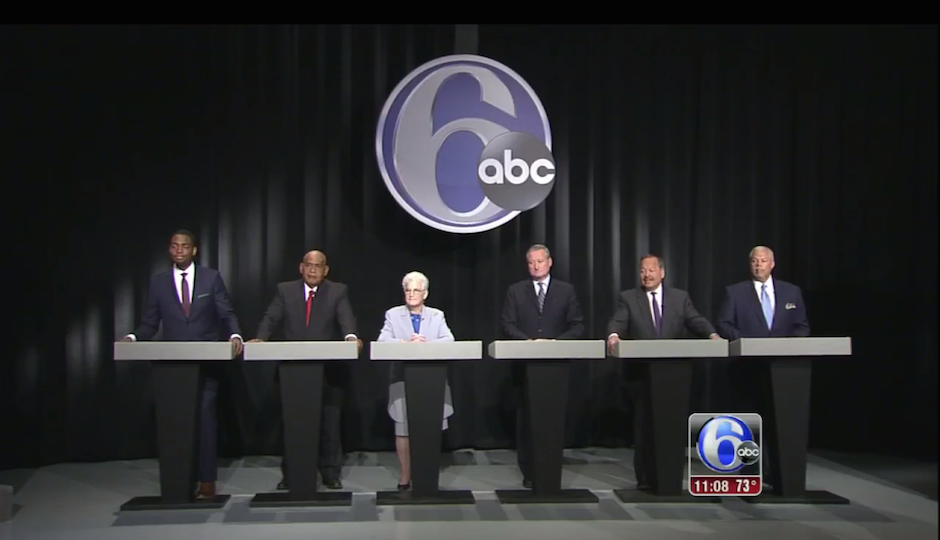The Brief: Tony Williams Misses Opportunity to Attack Jim Kenney at the Final Debate
1. The Last Televised Mayoral Debate Was a Snooze
The gist: After a mostly dull campaign, the mayoral candidates finally seemed poised to go to war at Tuesday’s debate airing on 6ABC. State Sen. Anthony Williams is trailing behind former City Councilman Jim Kenney in the mayoral race, according to internal polls. This week Williams also unveiled the first negative ad of the season, which attacks Kenney over ill-advised comments he made nearly two decades ago about the use of force by police. In other words, Williams had a lot to gain — and little to lose — by going after Kenney on TV. Plus, a mayoral forum on Monday at Temple University was feisty, seemingly setting the stage for an out-and-out brawl at Tuesday’s debate.
Why it matters: Williams never seized the opportunity to attack Kenney, though. The debate — if you want to call it that — was a mostly polite discussion among the mayoral candidates about police accountability, school funding and the city’s pension crisis. Asked by reporters afterward about his strategy, Williams said the event’s 45-second limit on answers prevented him from criticizing Kenney. However, ex-con and former state Sen. Milton Street managed to attack Williams several times for being supported by a trio of wealthy education reform advocates. This counts as a big loss for Williams, and a default win for Kenney.
2. News You Can Use: How to “Game the Voting Booth”
The gist: The Philadelphia Citizen wrote a how-to guide on voting strategically in the City Council At-Large race. If you love one candidate — for instance, Paul Steinke — but loathe the others, one strategy is to “bullet vote” for him. That means supporting Steinke only, even though you can cast five votes for City Council At-Large candidates in the May 19th primary election. Here’s why you’d theoretically want to do that:
Bullet voting does two things to help you: It increases his vote total, and it doesn’t increase anyone else’s. In an election with such imperfect information as this one, it’s impossible to know who’s going to win and who isn’t. When you vote, you have to assume the knife’s-edge scenario for your candidate: In this case, Steinke is sitting in sixth place, far behind the top four but only one vote behind the fifth place candidate prior to your vote. If you bullet vote, you can bring Steinke into a tie for fifth, at which point he at least has a chance to win. But if you don’t bullet vote and you happen to vote for the candidate who’s currently in fifth as well as Steinke, then you’ve accomplished absolutely nothing; your candidate is still in sixth, one vote behind fifth, and destined to lose.
Why it matters: Candidates with engaged, diehard supporters tend to get bullet votes. In an election with a number of viable City Council At-Large candidates, this strategy could make a difference. Who could it benefit? It’s hard to say for certain, but it’s likely that supporters of education firebrand Helen Gym would bullet vote for her. She (and others) could use it, considering how valuable the Democratic City Committee’s endorsement of City Council At-Large candidate Sherrie Cohen is and how much money Allan Domb is spending on his own campaign.
3. More News You Can Use: The Philly Bar Boos 21 Candidates
The gist: Speaking of voting strategically, the Philadelphia Bar Association has announced its recommendations (and non-recommendations) for the dozens of candidates running for Common Pleas Court and Municipal Court. The bar shot down five Common Pleas contenders supported by the Democratic City Committee. Lynn Marks, executive director of watchdog group Pennsylvanians for Modern Courts, told the Daily News why the bar’s recommendations and the city’s Democratic Party endorsements don’t always line up: “The bar looks exclusively at qualifications and the party also considers electability, having a balanced ticket of gender, racial, ethnic, sexual-orientation background and neighborhood.”
Why it matters: The Democratic City Committee’s focus on “electability” means that it sometimes doesn’t endorse highly qualified judicial candidates simply because their names appear in a low position on the ballot. That’s because the city’s Democratic Party likes to pick winners, and candidates at the top of the ballot tend to do better than those at the bottom. The bar says it doesn’t take that sort of stuff into consideration.
